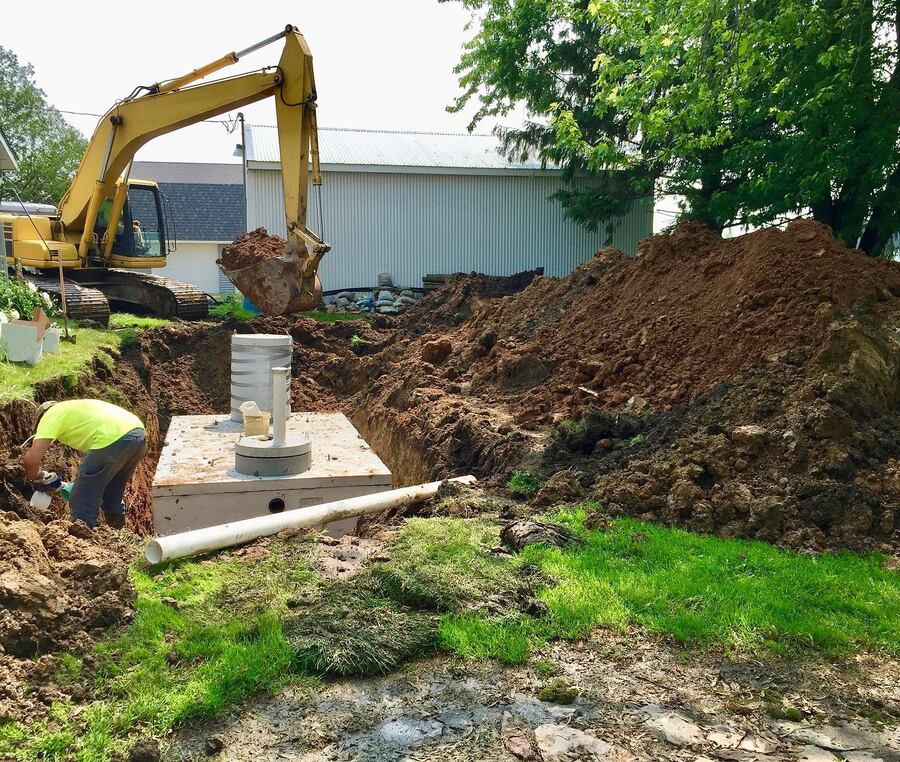
27
Concrete septic tanks are a popular choice for on-site wastewater management due to their durability and strength. However, like all septic systems, they have a limited lifespan. Fortunately, the longevity of a concrete septic tank can be significantly extended through careful installation, proper usage, routine maintenance, and timely part replacements.
In this brief article brought to you by Charlotte Septic Pros, we share 7 of our tips on maximizing the lifespan of your concrete septic tank. If you ever need urgent septic tank pumping or a repair, you can trust Charlotte Septic Pros to dispatch to your location as soon as possible.
The foundation of a long-lasting septic tank begins with proper installation. Hiring experienced professionals for the septic tank installation is practically non-negotiable. For one, You must make sure the installation complies with local regulations and guidelines to avoid future complications.
The installation process also involves selecting an appropriate location, ensuring the soil is properly compacted, and placing the tank on a stable base. Incorrect installation can lead to tank settling, cracking, or misalignment – all of which can significantly reduce the lifespan of your septic system.
Routine septic tank cleaning and inspections are fundamental for maintaining the health of your concrete septic tank. Over time, sludge and scum accumulate in the tank, reducing its efficiency and increasing the risk of system failure.
Pumping and cleaning the tank every three to five years, depending on usage and tank size, helps to prevent these build-ups. Additionally, regular inspections by a professional can identify early signs of wear, cracks, or other issues that may compromise the tank's integrity. Early detection can prevent more severe damage.
Excessive water usage can strain your septic system, leading to premature failure. Implement water conservation measures to reduce this strain and help maintain the balance within your septic tank. Educating household members about mindful water usage can also contribute to the longevity of your septic system.
Use water-efficient fixtures, fix leaks promptly, and avoid running multiple water-intensive appliances simultaneously. By reducing the volume of water entering the tank, you allow more time for solids to settle and be treated properly.
What you flush or pour down the drain can significantly impact your septic system’s performance and lifespan.
Avoid disposing of non-biodegradable items, grease, oil, and harsh chemicals in your sinks or toilets. These substances can cause blockages, disrupt the bacterial balance necessary for waste breakdown, and even damage the concrete. Use septic-safe cleaning products and dispose of household waste properly.
The drain field, or leach field, is an essential component of your septic system. Protecting this area is crucial for the overall functionality and lifespan of your concrete septic tank. Maintaining the area by ensuring proper drainage and avoiding excessive water runoff is also important.
Don’t park vehicles or place heavy objects on the drain field. These can compact the soil and damage the pipes. Additionally, be cautious about planting trees or shrubs with deep roots near the drain field. Invasive roots can infiltrate and clog the system in their search for water.
The bacteria in your septic tank play a central role in breaking down solid waste and saving valuable space in the tank. Maintaining this bacterial balance is essential for the efficient operation and longevity of your system.
Avoid using antibacterial soaps and harsh chemical cleaners that can kill beneficial bacteria. Instead, go for septic-safe products that support bacterial activity. There are also septic tank additives designed to boost bacterial levels, but it’s best to consult with a professional to make sure they are suitable for your system.
Timely septic tank repair is essential in preventing minor issues from escalating into major problems. If you notice signs of damage, such as cracks in the concrete, foul odors, or slow drainage, contact Charlotte Septic Pros as soon as possible.
Ignoring these warning signs can lead to severe damage and potentially costly repairs or even system replacement. Regularly monitoring your septic system and addressing any issues promptly can save you time, money, and extend the lifespan of your concrete septic tank.
Charlotte Septic Pros is an established and reputable septic company with a commitment to delivering exceptional septic service and even better customer service. Call Charlotte Septic Pros to speak with a member of our team today.

22
Can Bacteria Additives Eliminate the Need for Pumping? If you own a home with a septic system, you’ve probably seen…
Read more
12
A single slow drain in your home can feel like a minor inconvenience. Maybe the sink takes a little longer…
Read more
05
Are Slow Drains a Septic Issue or Just a Clog? Slow drains are one of those household problems that start…
Read more
02
What Septic Service Techs See That Homeowners Miss Most homeowners only think about their septic system when something goes wrong.…
Read more
21
Simple Habits That Protect Your Septic System A well-functioning septic system does its job quietly, but the moment something goes…
Read more
14
Pump Now or Pay Later: The Real Cost of Skipping Maintenance A properly functioning septic system is easy to forget…
Read more
11
Why Your Septic System Always Acts Up at the Worst Time Homeowners often feel that septic problems strike at the…
Read more
04
Early Warning Signs Your Septic Tank Needs Pumping For homeowners who rely on a septic system, routine maintenance is not…
Read more
29
Why Does My Septic System Smell Fine One Day and Terrible the Next? If you own a home with a…
Read more
19
Is Your Septic System Overdue? Simple Home Checks You Can Do Today For many homeowners, the septic system is a…
Read more